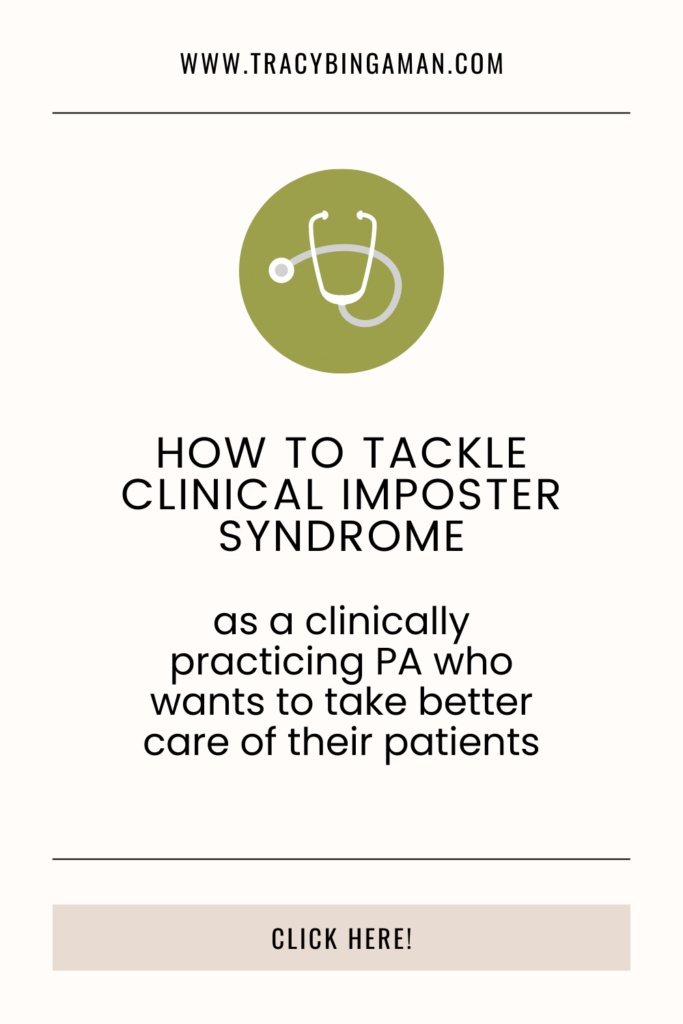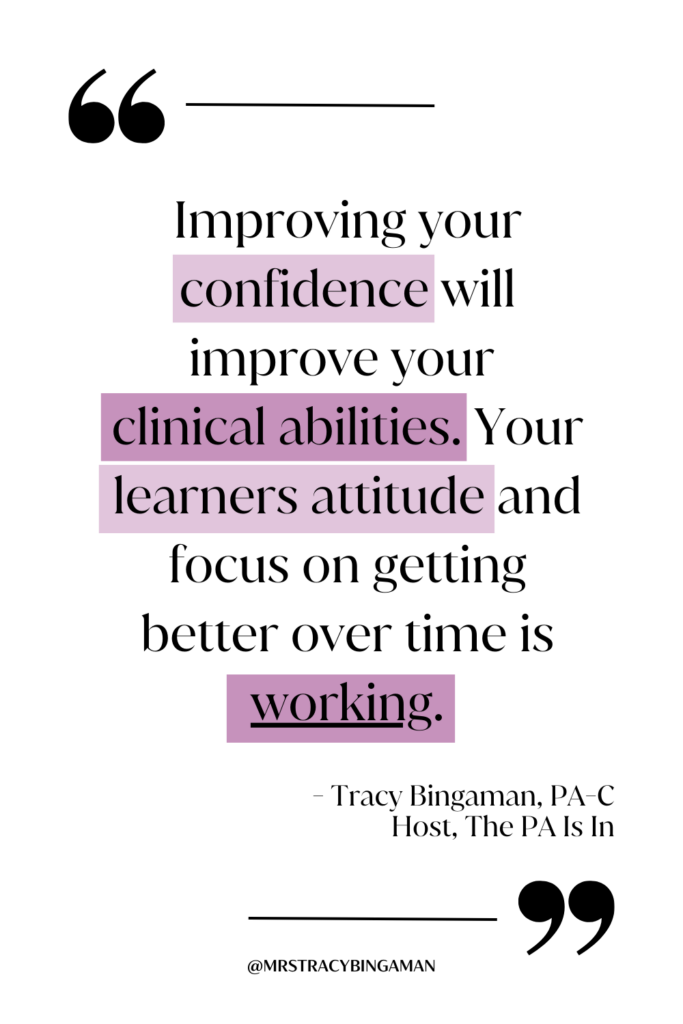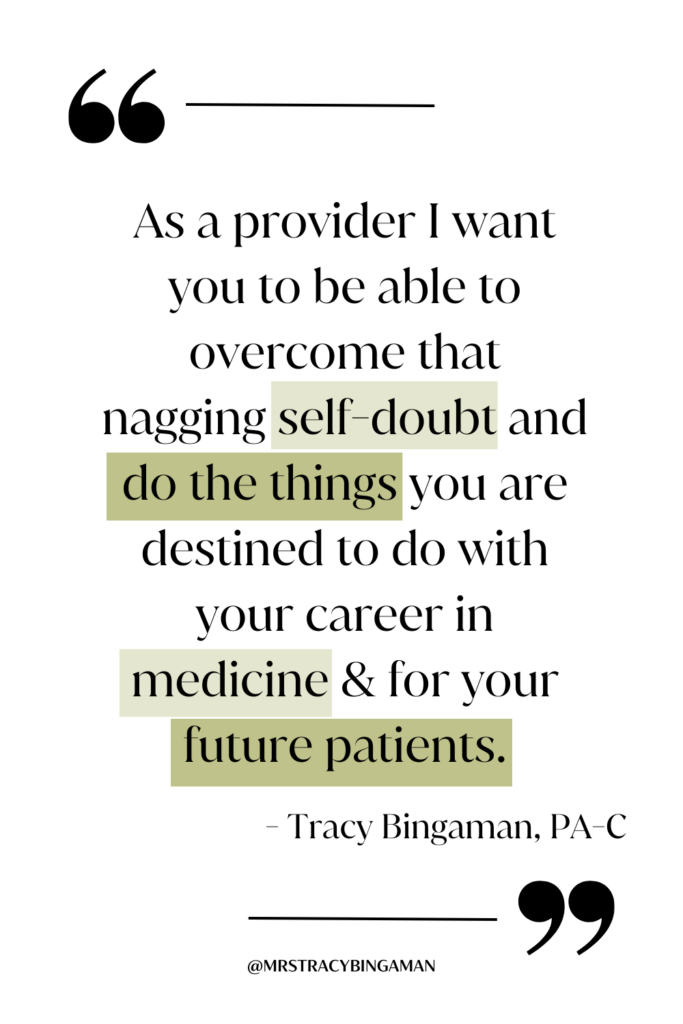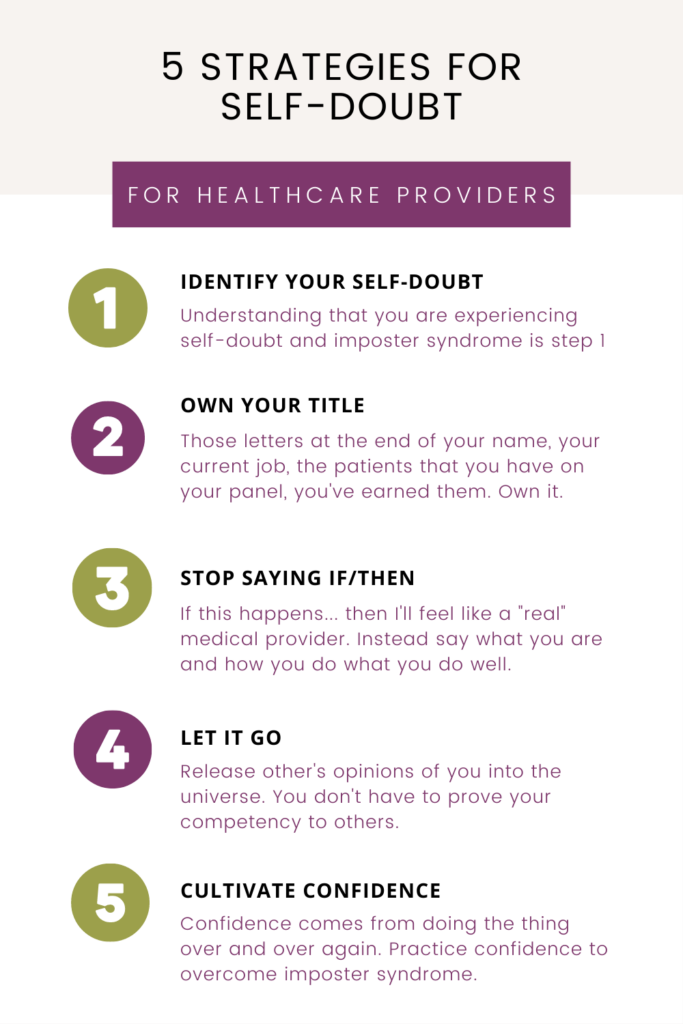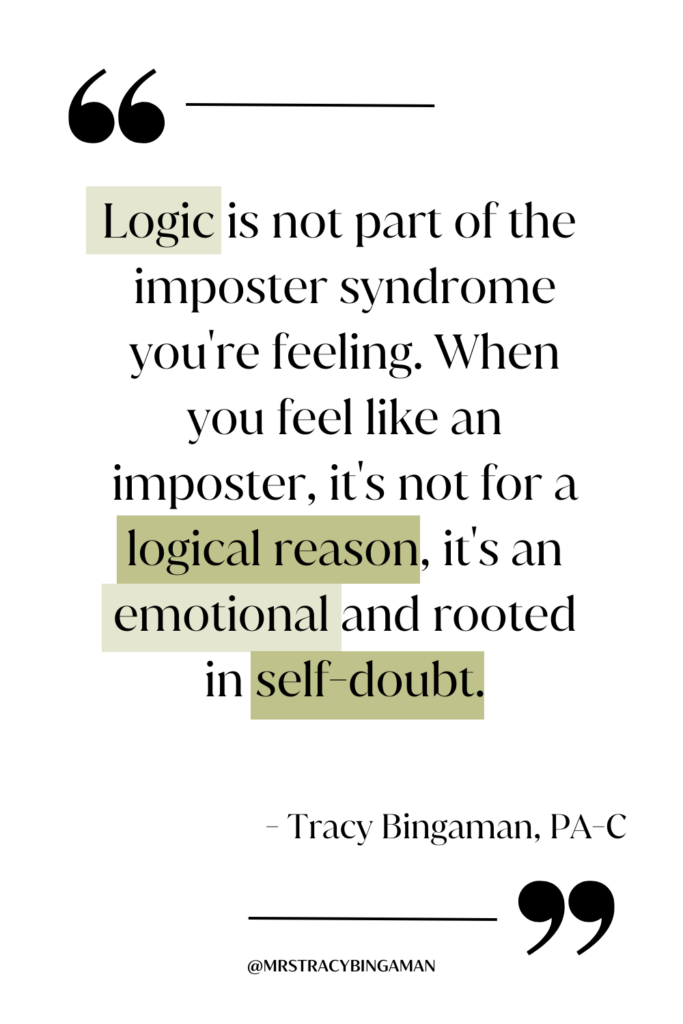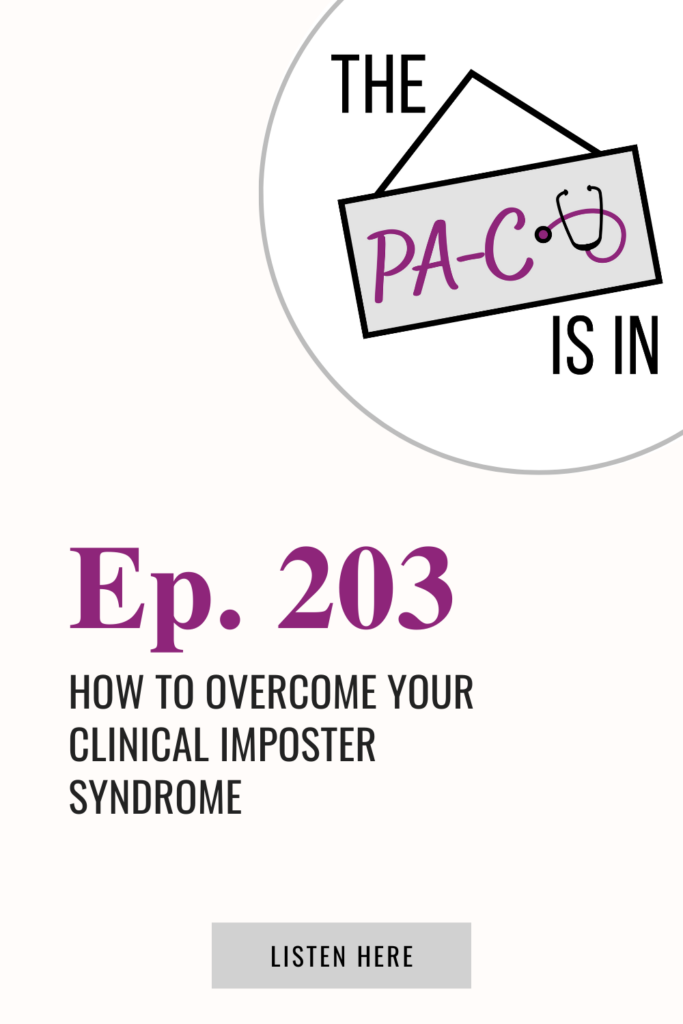
APPLE PODCASTS | SPOTIFY| YOUTUBE
If you take care of patients in any clinical capacity, there’s a really good chance that you’ve experienced imposter syndrome in the past. Specifically clinical imposter syndrome.
But something that’s been on my mind recently has been overcoming this feeling of imposter syndrome. That feeling that, even though you’ve objectively earned your spot, you don’t quite fit, you aren’t capable enough and you don’t belong.
I’ve worked in surgery for over ten years. A hard-driving and high-achieving PA who stepped into roles that I’ve never done in the past and these positions have often come with imposter syndrome as my own subspecialty.
Now that I’ve experienced imposter syndrome in both my personal and professional life, I want to share strategies to overcome those doubts.
So, my friend, this episode is me commiserating that imposter syndrome is real and pervasive and also reminding you that these doubts are something that you can and will overcome.
I may not have all the answers to the deep psychology or the ability to make you feel 11/10 confidence in any and all clinical encounter going forward, but I do feel like I’m in a place with my confidence and career where I’ve done some overcoming and I would love to help you to do the same.
To me, confidence is the greatest gift that we can give ourselves and out patients and I wish nothing but the same for you in your life and career.
Watch on YouTube

Imposter Syndrome in the Wild
Imposter Syndrome, we’ve all felt it. That feeling that, even though you’ve landed the job, nailed the interview, or reached the goal, and feeling out of place.
It’s reaching to the top of the mountain and looking left and right and thinking “any minute they are going to call me out and realize that I don’t belong here.”
When it comes to practicing clinically, imposter syndrome can rear its head, but this can also happen when it comes to applying for new jobs, stepping into leadership positions, joining committees and making shifts within your life and career.
Even the most accomplished clinicians can be plagued by imposter syndrome. It doesn’t matter what you’ve done, what specialty you work in, or how technical the procedures and medicine you are performing because imposter syndrome has nothing to do with experience or qualifications.
When imposter syndrome flares, your confidence and inner voice are under attack. It can impact your choices, your productivity, and have a significant influence on the course of your life and career.
Imposter Syndrome is a psychological phenomenon and I’m not a psych PA… however I’ve overcome that inner voice telling me “you’re not good enough” and “who do you think you are?” so I want to share both my own personal and professional experience with imposter syndrome and some strategies and evidence-based research for combating imposter syndrome.
As a provider, I want you to have the tools you need to step through that annoying self-doubt and do the things that you are destined to do. This episode will serve as a launchpad, a reminder of how to recognize your own imposter syndrome and start diagnosing the source and step into your strength as a provider.
Imposter Syndrome at Work
There are many ways that imposter syndrome can feel, seem and show up in your life. For me, I was able to call myself a surgery PA immediately.
I graduated, took the boards, and grabbed onto that “-C” at the end of PA and stood, seemingly confident, trying on my full length lab coat with relative confidence. But without the constant reassurance of multiple choice tests, end of rotation exams and the PANCE, I began to question my abilities.
Since I became a PA and stepped through those doors at my first position as a PA, I realized the weight of the decisions that I made. I understood that orders that I placed were no longer a trial run. This was the real deal.
Holy shit! No more trial run. No more dress rehearsal. No more short coat.
Hadn’t I survived, neigh, thrived throughout rotations (except the ER) and passed the end of rotation exams, proving my competence?
So why did I feel like I hadn’t earned it? Why was I questioning whether I truly belonged in this hospital, wearing these scrubs, donning this long lab coat, being looked to to make diagnoses and plan treatments.
I was comfortable with theoretical clinical medicine questions and clinical scenarios. In these scenarios the incorrect answer meant study more. In real life clinical practice, the incorrect answer could have significant and profound negative results.
People who are experiencing Imposter Syndrome sometimes think that they just scraped by, got to the place they are by simply luck alone. That’s how I felt.
Imposter Syndrome at Home
When I became a stepmother at the young, ripe, relatively clueless age and maturity (read: absolute immaturity) of 24, I felt like an imposter for years.
I was younger than all the other parents in the auditorium watching my stepsons elementary school concert. This was something that I noticed and perseverated on.
I lacked confidence in my parenting decisions. Overcorrecting for seasons of laxity and wanting to be friends with my stepsons and then letting the pendulum swing the other way and strongly enforcing rules to establish that I knew what I was doing as a parent is how this imposter syndrome manifested.
Always a lover of children, the weight of and overwhelming nature of parenting came as a surprise to me.
Imposter Syndrome and Women
This will come as no surprise to the listeners who identify as female, but when psychologists first described and identified this idea of imposter syndrome, they thought it only happened to women.
I am certainly not surprised by this. As women we face this perfect storm of pressure to do all the things at work and at home, to be all the things, to do it all without flaw or faltering. We feel we need to be a provider who makes no mistakes, steps into leadership positions, rocks at work, a perfect mom, wife, friend and homemaker, a loving partner.
The way that we feel worth is intimately related to the way that we exist at work or relative to those in our lives. We feel worthy because of what we do and who we serve, not because of who we are.
And then there is comparison. It’s been said loudly and repeatedly that comparison is the thief of joy. Yet here we are, comparing ourselves to those around us in life and on the internet and social media.
We see our friends (and friends of friends and people who used to be friends and downright strangers) sharing about their career, clinical and life accomplishments.
It’s incredibly easy to feel like we are not worthy of anything when we hold up our life, our career, our relationships – the ones who we feel like a fraud inside – as compared to the highlight reel of other’s lives.
A younger, newer, more green version of Tracy would feel more discouraged to see the accomplishments, titles, job changes and promotions of those around her. Because who am I, just trudging along in my new career, battling the dragon of self-doubt in my mind on the daily, while everyone else is wracking up accolades.
Imagine if I had stopped there, if I let the pressure of others’ moves and achievements stop me before I started? I don’t know or really even want to think about what my life would look like if Imposter Syndrome had taken control of the future and my career choices.
Identify Your Imposter Syndrome
As with any diagnosis that we make in a patient, step 1 in identifying Imposter Syndrome in ourselves is knowing that it exists. Furthermore, understanding why Imposter Syndrome exists.
We have self-selected to be driven, achievers, who want to accomplish big dreams, who want to do big things, whether from internal or external pressure – that drive inside of us or what our families, friends and society thinks we will achieve – and you’re most likely measuring your ability to achieve against others.
So, you’ve identified that sometimes you question whether you belong in this place. You realize that Imposter Syndrome is a part of being a provider, of practicing clinically, and the fact that working in medicine is as much art as it is science.
Tips to Overcome Imposter Syndrome
Own Your Title
Because you’ve earned it, more than earned it, and put the time and energy, the learning and the clinical practice in. You need to OWN that title.
Take a moment to write down your title – bonus points for pen and paper but full credit for using the notes app in your phone – and start a list.
Write down your title.
Your name, a comma, and your credentials
But don’t stop there.
Are you a medicine, surgery, emergency, or critical care provider?
Claim both your title and your specialty in bold letters with confidence.
Then, make three bullet points and answer the questions:
- Who do you take care of?
- How do you serve them?
- How are they better off for having seen you?
One of the most powerful ways to combat Imposter Syndrome is to know clearly the role you play in medicine. No one is expecting you to know everything about everything. Clearly define your area of expertise, the way you take care of patients, and how you serve those patients.
Understanding that role and feeling more confident about answering those three questions about who you take care of, how and why they are better off after seeing you will make you feel less and less like a fraud.
Don’t add caveats, areas that you are struggling in, or disclaimers. Keep it succinct and simple. State what you do.
Don’t Say “Once/Then” Anymore
You know those statements like “once I’ve been here 6 months, THEN I’ll feel comfortable taking care of this type of patients” or “If I feel confident and never question my clinical decision making, THEN I’ll truly be an oncology PA.”
Does that sound like something that you’ve said to yourself? Constantly moving the finish line of your confidence further and further away?
Have you made those Once/Then Statements in your head? When you are growing in your confidence as a provider, especially in a new space or role, it’s natural to want to give yourself goals and benchmarks or metrics to quantify your confidence and abilities.
Reframe your Once/Then Statements to am/because. Instead of saying “If I feel confident and never question my clinical decision making, THEN I’ll truly be a real oncology PA” you rewrite that sentence to be “I am a real oncology PA BECAUSE I care enough about my patients AND am willing to learn as a I go, check my work, and continually improve my patient care.”
There is no benchmark there, no challenge to your confidence and competence.
The second statement starts, instead of with IF, with I am. It brings in the reason why and reminds you that you are able to take action, to learn more, to improve your skills and clinical abilities.
It’s the way our education is structured. First this, then that. Learn subject A and then subject B. Once you’ve established your abilities with certain materials and skills, then you are ready to move on to the next topic, subject or unit.
That’s not exactly how it works in clinical medicine, though, is it? It’s not linear. It’s not first learn X and then learn Y.
So, let’s stop trying to measure our clinical competency and success by the same ruler and rubric. You aren’t getting feedback in clinical practice in the same was as you did as a student?
If you have ONE patient, you are a provider. Let’s master the mindset and remind ourselves that doing the darn thing, even with doubt, still means that we are doing it.
The problem that comes with those benchmarks, that moving target, those goals, is that we keep raising the bar. We keep moving the finish line further and further ahead of us, propagating the myth that we are telling ourselves that we don’t belong, we aren’t confident and we cannot succeed.
We will continue to discredit our success and all that we have learned because we’ll be chasing the next milestone, the next landmark, the next goal or competency. By focusing forward on all the things we haven’t yet learned, perfected, practiced and improved upon, we are not giving enough weight to ALL the things we have already learned, mastered and can do with confidence.
This moving target is a set up to send us back into Imposter Syndrome and spiral into self-doubt and distrust of your clinical abilities and accomplishments again and again.
Understand That No One Is Perfect
I’m issuing you with a challenge when it comes to the way that you see those around you and their practice of medicine and clinical competence and confidence.
No one is perfect. Because those around you are people, too.
Even if they are physicians. Even if they are more experienced with patients or in your particular specialty. Those people are not perfect.
They have doubts. But just like your doubts, their doubts are on the inside.
As I said before – it’s called practicing medicine for a reason. You are practicing. You are all doing the best you can with the knowledge that you have.
Basing your decisions on evidence. Working to connect with patients and get them on board with their medical decisions and plan ongoing.
Today you practice and tomorrow you’ll evaluate and work to improve your skills.
Of course we are basing our diagnosis and treatment on evidence, the latest resources at our disposal, but then there is the art of practicing medicine.
The human connection. The ability to connect with patients, to get them to trust and share with you.
This art of medicine is harder to quantify. It’s softer, more intuitive.
This can leave the art of practicing medicine as an area of vulnerability to Imposter Syndrome or an opportunity for confidence in your abilities or softer skills.
No one is perfect. Even those who appear to be thriving around you.
Admit You Don’t Know Everything About Anything
And because we are practicing medicine, in a landscape that is constantly changing with new studies, science and data coming out constantly, it bears stating:
Just because you own your title and step into your confidence as a provider and in your role or specialty, doesn’t mean you need to know everything.
No one has all the answers. In fact, I want you to admit to yourself that you don’t have all the answers and that is OK. That’s what it’s like to be a human being providing medical care to other human beings.
There are red herrings. There are zebras. There are idiopathic things that happen. There are things that we don’t yet understand.
Therapies that have yet to be invented. Treatment strategies you haven’t yet learned about. Interviewing techniques that you don’t yet know.
If you’re faced with a question, a patient, a diagnoses, a disease process that you don’t know about (yet) and THAT’S OKAY.
You have permission, not that you need it, to be a constant student of medicine. To be learning ongoing. To be discovering new skills, diagnoses, and abilities.
Practicing medicine, stepping into leadership, trying new positions is about starting with imperfect action, using your knowledge base and learning and improving over time.
You have wonderful, amazing knowledge and clinical gifts. I’d hate for you to hide that ability from the world. There are patients out there that need you.
Don’t let the possibility of not knowing every answer to every question, every exact diagnosis and treatment plan, hold you back from reaching your full potential.
I challenge you to do your best, to not aim for perfection, and to be open to continually learn.
Get comfortable with saying “I don’t know” in response to a patient’s question, to look things up, to investigate and do further research, to ask for help and learn new things along the way.
That is how you grow as a person and as a provider. Those “I don’t knows” and the research and learning that comes after is where you grow.
Growing in clinical knowledge and confidence is what helps you to overcome Imposter Syndrome.
With every new answer, research paper, learned fact, specific technique or approach that you learn, you’ll be walking in the right direction.
New questions will arise… They are always new. New patients, situations, specialties and challenges will crop up. Trust me, hard questions never stop cropping up, but just because you don’t already know the answer and haven’t already encountered the situation, it doesn’t make you an imposter.
It’s Not Your Job
It’s not your job to convince others in your life that you are confident and clinically competent or that you have the ability to do your job well. It’s your job to lean into learning and grow in your confidence to help overcoming that Imposter Syndrome.
Your confidence is contagious and improving your confidence will, in turn, help those around you to see your competence and clinical ability.
You’ll know that your clinical abilities, your learners attitude and your willingness to get better over time is worth it. The patients you are taking care of today and next week and next year will benefit from that growth and confidence.
Everyone, at times, feels like a fraud. Like an imposter inside of their own world, life and job. It shows up in different ways at different times for different people. But Imposter Syndrome is deeply rooted in our achievement-mindedness while we are walking towards our biggest dreams and career goals.
Chasing those dreams, stepping into new roles, and changing places inside of medicine comes with fear and occasional uncertainty. Don’t let those things stop you before you even start, my friend.
Pin for Later

